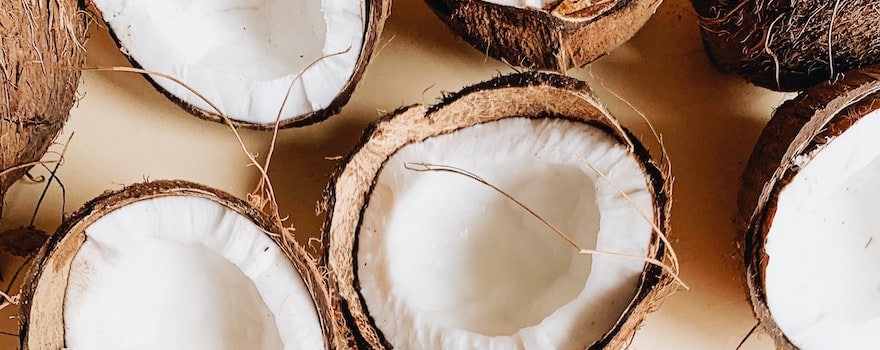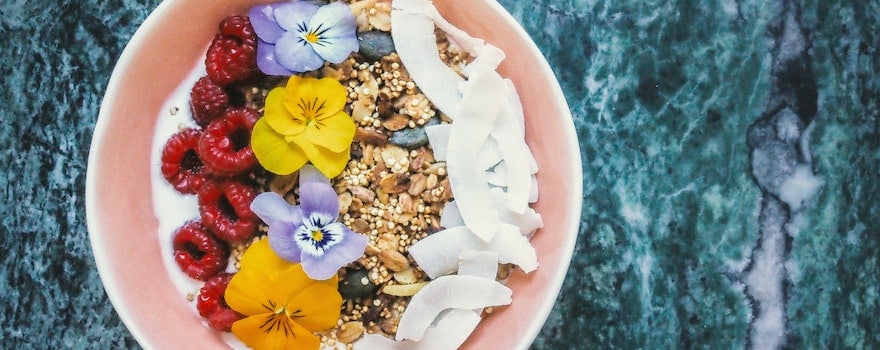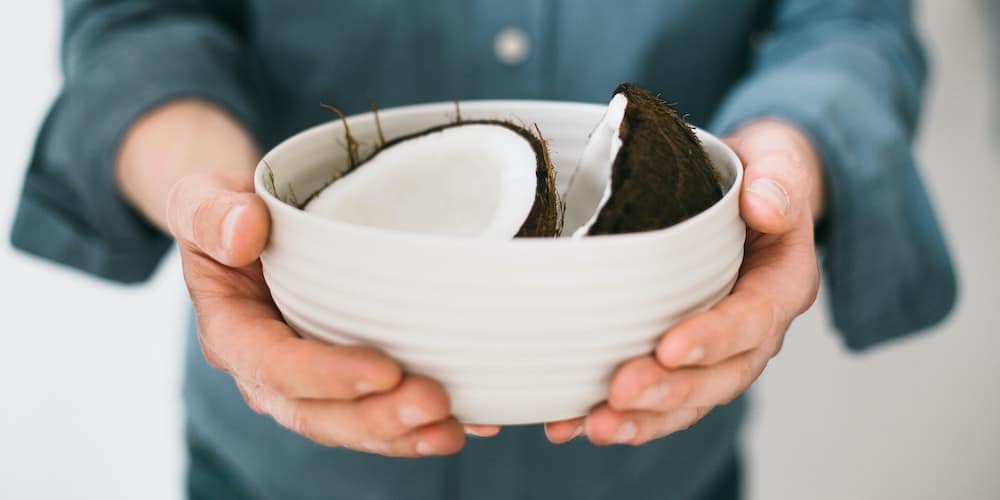What is coconut?
The coconut is the fruit of the coconut palm (Cocos nucifera). It is a species of palm belonging to the Arecaceae family, like the date palm. Native to Malaysia, it now grows in many tropical regions : Southeast Asia, South America, Pacific islands…
It can reach 30 m in height and produces large fruits that can weigh up to 1.5 kg.
The coconut has long been consumed for its nutritional qualities and its medicinal properties. In India, it is called « Kalpavriksha » which means ‘the tree that gives everything’ in Sanskrit. The fruits are versatile and can be used to produce many by-products: water, cream, and coconut oil.
Very rich in water, it is also a source of vitamins and minerals. Studies also reveal antioxidant and cardioprotective effects. Finally, it is interesting for improving and supporting cognitive functions such as memory.
Nutritional composition
- Acides aminés
- Vitamines : B1, B2, B3, B5, B6, B9, C, E, K
- Minéraux et oligo-éléments : magnésium, zinc, manganèse, phosphore, potassium, calcium, cuivre, fer, sodium, iode
- Eau
- Lipides
- Protéines
- Fibres
- Glucides
- Acides gras : acide laurique, acide myristique, acide palmitique
- Actifs antioxydants : polyphénols (acide gallique, acide ferulique, quercétine)

Benefits of coconut
💦 Hydrating
The coconut is composed of about 45 % water. This is what makes it particularly hydrating and thirst-quenching. Thus, it contributes to the body’s daily water needs. It compensates for fluid losses during the day.
Coconut water is ideal for athletes. It provides effective rehydration after exercise. In addition, it supplies all the electrolytes essential for muscles: magnesium, potassium, sodium, calcium, and phosphorus.
This beverage is remineralizing and helps restore the fluid and mineral losses caused by sweating.
This study from Universiti Sains Malaysia in Kelantan (Malaysia), conducted in athletes, demonstrates the hydrating effect of coconut water.
🍽 Source of vitamins and minerals
The fruit contains a wide variety of vitamins, minerals, and trace elements. B vitamins are well represented. Notably, it contains vitamin B6, which supports the immune system and is involved in the synthesis of several hormones.
Vitamin C is also present in a noteworthy amount: about 3 mg per 100 g.
In terms of minerals, it is an excellent source of potassium, with about 350 mg per 100 g. This element is essential for muscle function. It also provides iron, manganese, copper, and zinc. Thus, it actively contributes to the recommended daily intakes and helps prevent deficiencies.
This review from Nanyang Technological University (Singapore) examines in detail the composition of coconut water.
🥝 Antioxidant
Polyphenols are the primary antioxidants in coconut. They consist of gallic acid, ferulic acid, and quercetin. They fight free radicals and protect the body’s cells.
Selenium, manganese, and zinc are also antioxidants. Their action is complemented by that of vitamins C and E. They act against cellular aging by limiting the production of free radicals.
This review from the Amala Cancer Research Center (India) shows how coconut oil protects cells from pro-oxidant damage.
❤️ Protects the heart
Its consumption is beneficial for protecting the heart. Indeed, it reduces high levels of cholesterol and triglycerides and lowers blood pressure. These are all factors responsible for cardiovascular diseases.
In addition, it facilitates the contraction of the heart muscles. Potassium, meanwhile, helps maintain the heart rhythm.
This study from the University of Otago (New Zealand), conducted in humans, shows how coconut oil supports cardiovascular health.
🧑🏫 Improves memory
Coconut also has beneficial effects on the nervous system. It supports cognitive functions and notably improves memory.
On the one hand, its fatty acids ensure the protection of neurons. On the other hand, polyphenols prevent the aggregation of the amyloid-β peptide, involved in Alzheimer’s disease. Finally, by acting on neurotransmitters, magnesium improves brain and cognitive functions.
This review from Edith Cowan University (Australia) shows the potential of coconut in the prevention and treatment of Alzheimer’s disease.

How to consume coconut?
Fresh coconut
The coconut tree produces almost all year round. Fresh fruits are therefore easy to find on market stalls or in stores. The best period runs from November to February.
Choose a heavy fruit, without cracks and without signs of mold. You should also hear the water sloshing when shaking. Once opened, you can drink the coconut water or eat the flesh, as is or grated.
Discover how to open a coconut at the end of this article!
Coconut water
Also called ‘coconut water’ , it is naturally present in the fruit. It contains 94% water and very few calories. It is refreshing and a good ally for weight loss.
It can be enjoyed pure or added to cakes, cookies, cocktails, mocktails, smoothies…You can also use it in cosmetics for skin and hair care. It is moisturizing, antioxidant, anti-inflammatory and anti-aging.
Coconut milk
It is obtained by grinding the coconut flesh and adding hot water. It has a creamy consistency. It can be used in cooking and notably in baking. You can also add it to purees, creamy soups, chicken or fish curries…
Finally, it is a delicious lactose-free beverage and casein-free.
Coconut cream
It comes from the same process but with less water added than for coconut milk. That is why it has a thicker, creamier texture.
It is a plant-based alternative to crème fraîche. It can be used in desserts as well as in fish, vegetable, or poultry dishes.
Coconut oil
It is extracted from the fruit’s fresh pulp, pressed and then finely ground. In cooking, it is used for cooking (up to 177°C), to replace fats, or to make your sauces and dressings.
Choose virgin coconut oil, cold-pressed, unrefined, and organic.
For external use, coconut oil is also beneficial for hair.
Coconut flour
Once extracted, the coconut flesh is dried and defatted. It is then ground to obtain a flour with a mild, slightly sweet taste. It is used in recipes for cakes, loaf cakes, pie doughs, pastries… Add it at 15 to 25% of the mixture and combine with another flour.
It is a gluten-free flour with a low glycemic index (GI 35).

Consume sustainably: prioritize organic and fair-trade coconut
✓ Indonesia, the Philippines and India are the world’s main producers. Unfortunately, growing demand is leading to abuses : massive pesticide use, animal cruelty ( enslaved monkeys )…
✓ Prefer fruits grown in organic farming and from fair-trade supply chains. That way, you’ll support the work of local producers.
Dosage
There isn’t really a recommended dosage.
Simply avoid consuming it in excess.
Contraindications and side effects
Coconut consumption does not present any contraindications. However, it can trigger allergies in some people.
When consumed in moderation, it does not cause side effects. If you experience adverse symptoms, stop consumption and consult a doctor.
Sources and scientific studies
Manisha DebMandal, Shyamapada Mandal 2011. Coconut (Cocos nucifera L.: Arecaceae): in health promotion and disease prevention.
I Ismail, R Singh, R G Sirisinghe, 2007. Rehydration with sodium-enriched coconut water after exercise-induced dehydration.
Jean W H Yong, Liya Ge, Yan Fei Ng, Swee Ngin Tan 2009. The chemical composition and biological properties of coconut (Cocos nucifera L.) water.
Soorya Parathodi Illam, Arunaksharan Narayanankutty, Achuthan C Raghavamenon, 2017. Polyphenols of virgin coconut oil prevent pro-oxidant mediated cell death.
Laurence Eyres, Michael F Eyres, Alexandra Chisholm, Rachel C Brown, 2016. Coconut oil consumption and cardiovascular risk factors in humans.
W M A D B Fernando, Ian J Martins, K G Goozee, Charles S Brennan, V Jayasena, R N Martins, 2015. The role of dietary coconut for the prevention and treatment of Alzheimer’s disease: potential mechanisms of action.



